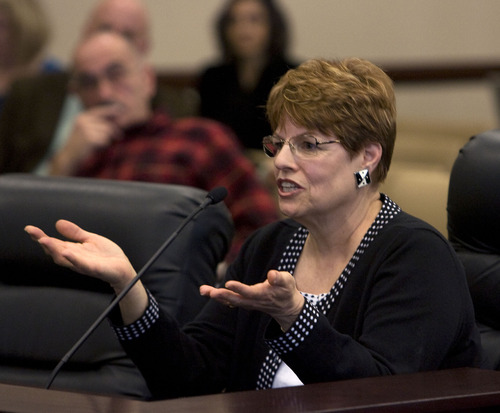This is an archived article that was published on sltrib.com in 2014, and information in the article may be outdated. It is provided only for personal research purposes and may not be reprinted.
I would agree with Gov. Gary Herbert that things have changed as a result of recent Utah Transit Authority audits. Case in point, the 2010 legislative audit detailing the conflict of interest of board member Terry Diehl and his subsequent multimillion dollar profit as a result of a land deal on the Draper TRAX station. This all took place while Diehl was the point person for UTA, while denying having any financial interest in the project until just before the vote.
The audit suggested a law may have been violated. State Rep. Greg Hughes, UTA chairman, argued it was perfectly acceptable, and the general counsel for UTA, Bruce Jones, gave his blessing, stating Diehl's conflict did not violate the Transit Act code. The Office of Legislative Research and General Counsel strongly disagreed, going to the unprecedented move of diagraming that section of the law on a large poster board for legislators. The complaint was eventually sent to the attorney general's office.
The result was that weeks later UTA pushed for a change which completely gutted the conflict of interest law, making it legal for trustees to profit from UTA decisions as long as it was disclosed.
Next, the last three audits have stated salaries of top UTA officials were excessive. UTA's change was to totally ignore the audits and increase wages and benefits. Prior to the 2008 audit, Bruce Jones' base pay and benefits was $250,665. In the 2014 audit it was listed as $384,472, an increase of $133,807, more than a 50 percent increase to an already excessive salary.
General Manager Michael Allegra went from $260,480 to $402,187 in the 2014 audit, also well over a 50 percent increase. Those were real changes.
There was a response from Hughes that mistakes has been made in the past and they have learned from them. These were not mistakes. These were calculated moves to benefit the developer, a board member and top employees. Giving $10 million to a developer without proper information was not a mistake on UTA's part. It was a "sweetheart deal."
The agencies' response to these audits is that UTA has done brilliant work and laid a record number miles of track. But how does that really relate to moving people? For the money spent it moves very few people, and it dramatically reduced bus service. UTA has built a system it can't afford to run in the future. The last two audits said revenues were overestimated while costs have been underestimated. The audit also pointed out that asset maintenance could be a potential $2.9 billion.
It appears that with such a rapid pace of building is unsustainable.
The bottom line is that building transit requires more than spending record amounts of money. And so far the money spent and the amount of people it moves is not a successful transit agency.
Changes will never be made by the same leadership. The board should be replaced and the general counsel and general manager must go.
It has been stated that this will never happen because of the political clout they have (i.e. Herbert and Hughes, who could be the next speaker of the House.)
What they haven't realized is that citizens will not accept this and fund this corrupt leadership. If the past is any indication of the future, the state is in a lot of trouble.
It is easy to see how the last two attorneys general operated so long without being brought to justice and it explains why state leaders have accepted this disastrous situation while being the apologist for UTA's out of control behavior. Someone in state government must step up and show some real leadership and correct this situation.
Claire Geddes is a citizen advocate and former director of Utah Legislative Watch.



